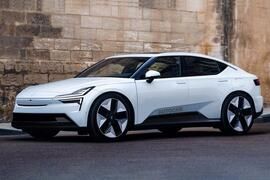 EV firm targets significant ales growth with expanded line-up led by crucial new Porsche Macan rival
EV firm targets significant ales growth with expanded line-up led by crucial new Porsche Macan rival
The new Polestar 7 will be a Porsche Macan-rivalling premium SUV, and the firm’s first model that will be produced in Europe.
The Gothenburg-based firm has confirmed early details of the new car as part of a revised strategy, which includes a target to grow sales by 30-30 per cent in the coming three years.
The forthcoming 7 will essentially serve as a successor to the Polestar 2 crossover, although it will not be a direct replacement - with this announcement hinting it will take more of an overly SUV form.
Polestar’s new head of design, Philipp Romero, said: “Polestar is known for its progressive design, with each car standing out and creating its own buzz – so too will Polestar 7.” He added that the new machine will be “everything our customers expect from us, both in terms of design and performance.”
Polestar has yet to give details on where in Europe the 7 will be produced, but it is known to have been looking at a new plant in Slovakia.
Polestar's profitability target
Former Opel boss Michael Lochschellar was recently named as Polestar's new CEO after Thomas Ingenlath resigned last August after seven years in charge of the Geely-owned brand. He has now revealed an updated business strategy that involved "significant changes" to improve its operations and financial performance.
The new Polestar 3 and 4 models accounted for more than half of its orders in the final quarter of last year, and the firm's line-up will continue to expand with the launch of the Porsche Taycan-rivalling 5 saloon due this year.
Polestar says that, along with the arrival of the 7 – previously announced as due to launch in 2027 – will help achieve its ambitious plans to boost sales volume by around a third. By that date, the firm is also aiming to have a positive free cash flow.
Notably, the firm is also aiming to eventually move all its models to a single vehicle architecture, which it says will reduce "complexity, costs and investments."
Lochscheller said that "we are building on the strong Polestar brand with design and performance at its core. But significant changes are needed to make this well-respected progressive brand a successful and viable business."
The firm is also speeding up its retail expansion, with the goal to increase the number its 'Spaces' showrooms by 75 per cent by the end of next year, expanding to 130 locations in Europe and 57 in North America. Polestar is also set to launch in France, where its launch had been delayed by a dispute with Citroën over its logo design.
Adding a European manufacturing presence will also help Polestar expand the base of its 'asset-light' business model. Originally Polestar only made cars in China, but the 3 is now built alongside the Volvo EX90 in South Carolina, USA and the firm also has a production presence in South Korea.
Polestar is also aiming to capitalise on its EV-only line-up by selling CO2 credits to other manufacturers who are striuggling to hit their European Union targets – a tactic that has proven highly profitable for firms such as Tesla.